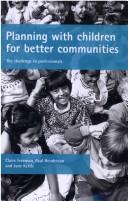| Listing 1 - 5 of 5 |
Sort by
|

ISBN: 0765616408 131549745X 9786610912681 1280912685 0765622203 1315497441 9780765622204 9781280912689 9780765616401 9781315497440 6610912688 9781315497426 9781315497433 1315497433 Year: 2007 Publisher: Armonk, N.Y. London M.E. Sharpe
Abstract | Keywords | Export | Availability | Bookmark
 Loading...
Loading...Choose an application
- Reference Manager
- EndNote
- RefWorks (Direct export to RefWorks)
A comprehensive collection of the research and policy developments in civic service worldwide, this work provides an assessment of what works and what doesn't work in the field. It presents a conceptualization and operational definition of civic service that allows for variations across nations and cultures.
Labor service. --- National service. --- Young volunteers in community development. --- Youth volunteers in community development --- Alternative military service --- Service, Alternative military --- Service, National --- Service, Labor --- Community development --- Public welfare --- Recruiting and enlistment --- Social service --- Labor
Book
ISBN: 1634847652 9781634847650 9781634847469 1634847466 Year: 2016 Publisher: New York
Abstract | Keywords | Export | Availability | Bookmark
 Loading...
Loading...Choose an application
- Reference Manager
- EndNote
- RefWorks (Direct export to RefWorks)
Youth --- Young volunteers in community development --- Youth and violence --- Violence and youth --- Violence --- Youth volunteers in community development --- Community development --- Young people --- Young persons --- Youngsters --- Youths --- Age groups --- Life cycle, Human --- Social conditions. --- Health and hygiene.

ISBN: 1861341881 9781861341884 9781847425065 9786612318672 1282318675 1847425062 Year: 1999 Publisher: Bristol, UK Policy Press
Abstract | Keywords | Export | Availability | Bookmark
 Loading...
Loading...Choose an application
- Reference Manager
- EndNote
- RefWorks (Direct export to RefWorks)
In addition to clarifying why the issue of children's participation should be prioritised, this book uses examples and case studies from a variety of professions and disciplines in order to explain different methods that can be used to support participation.
Child welfare --- Child welfare. --- Children --- Children's rights --- Community development --- Community development. --- Développement communautaire --- Enfants --- Jeunes bénévoles dans le développement communautaire --- Planification sociale --- Service social aux enfants --- Social planning --- Social work with children --- Social work with children. --- Young volunteers in community development --- Services for --- Droits --- Services --- Formation --- Participation des citoyens --- Citizen participation --- Training of --- Great Britain. --- Youth volunteers in community development
Book
ISBN: 9780691147093 0691147094 9780691162072 0691162077 Year: 2011 Publisher: Princeton, N.J. Princeton University Press
Abstract | Keywords | Export | Availability | Bookmark
 Loading...
Loading...Choose an application
- Reference Manager
- EndNote
- RefWorks (Direct export to RefWorks)
Volunteering improves inner character, builds community, cures poverty, and prevents crime. We've all heard this kind of empowerment talk from nonprofit and government-sponsored civic programs. But what do these programs really accomplish? In Making Volunteers, Nina Eliasoph offers an in-depth, humorous, wrenching, and at times uplifting look inside youth and adult civic programs. She reveals an urgent need for policy reforms in order to improve these organizations and shows that while volunteers learn important lessons, they are not always the lessons that empowerment programs aim to teach. With short-term funding and a dizzy mix of mandates from multiple sponsors, community programs develop a complex web of intimacy, governance, and civic life. Eliasoph describes the at-risk youth served by such programs, the college-bound volunteers who hope to feel selfless inspiration and plump up their resumes, and what happens when the two groups are expected to bond instantly through short-term projects. She looks at adult "plug-in" volunteers who, working in after-school programs and limited by time, hope to become like beloved aunties to youth. Eliasoph indicates that adult volunteers can provide grassroots support but they can also undermine the family-like warmth created by paid organizers. Exploring contradictions between the democratic rhetoric of empowerment programs and the bureaucratic hurdles that volunteers learn to navigate, the book demonstrates that empowerment projects work best with less precarious funding, more careful planning, and mandatory training, reflection, and long-term commitments from volunteers. Based on participant research inside civic and community organizations, Making Volunteers illustrates what these programs can and cannot achieve, and how to make them more effective.--Publisher description.
Community development --- Voluntarism --- Volunteer workers in community development --- Young volunteers in community development --- #SBIB:324H60 --- #SBIB:316.8H30 --- Community development personnel --- Youth volunteers in community development --- Voluntary action --- Volunteer work --- Volunteering --- Volunteerism --- National service --- Associations, institutions, etc. --- Politieke socialisatie --- Professies en methoden in het welzijnswerk: sociaal werk, vrijwilligerswerk, hulpverleningsmethoden … --- Voluntarism - United States - Case studies --- Young volunteers in community development - United States - Case studies --- Volunteer workers in community development - United States - Case studies --- Community development - United States - Case studies --- Sociology of culture --- Sociology of social care
Book
ISBN: 1283009153 9786613009159 1400838827 9781400838820 9780691147093 0691147094 9781283009157 6613009156 Year: 2011 Publisher: Princeton, NJ
Abstract | Keywords | Export | Availability | Bookmark
 Loading...
Loading...Choose an application
- Reference Manager
- EndNote
- RefWorks (Direct export to RefWorks)
Volunteering improves inner character, builds community, cures poverty, and prevents crime. We've all heard this kind of empowerment talk from nonprofit and government-sponsored civic programs. But what do these programs really accomplish? In Making Volunteers, Nina Eliasoph offers an in-depth, humorous, wrenching, and at times uplifting look inside youth and adult civic programs. She reveals an urgent need for policy reforms in order to improve these organizations and shows that while volunteers learn important lessons, they are not always the lessons that empowerment programs aim to teach. With short-term funding and a dizzy mix of mandates from multiple sponsors, community programs develop a complex web of intimacy, governance, and civic life. Eliasoph describes the at-risk youth served by such programs, the college-bound volunteers who hope to feel selfless inspiration and plump up their resumés, and what happens when the two groups are expected to bond instantly through short-term projects. She looks at adult "plug-in" volunteers who, working in after-school programs and limited by time, hope to become like beloved aunties to youth. Eliasoph indicates that adult volunteers can provide grassroots support but they can also undermine the family-like warmth created by paid organizers. Exploring contradictions between the democratic rhetoric of empowerment programs and the bureaucratic hurdles that volunteers learn to navigate, the book demonstrates that empowerment projects work best with less precarious funding, more careful planning, and mandatory training, reflection, and long-term commitments from volunteers. Based on participant research inside civic and community organizations, Making Volunteers illustrates what these programs can and cannot achieve, and how to make them more effective.
Community development --- Volunteer workers in community development --- Young volunteers in community development --- Voluntarism --- Community development personnel --- Youth volunteers in community development --- Voluntary action --- Volunteer work --- Volunteering --- Volunteerism --- National service --- Associations, institutions, etc. --- Community House. --- Snowy Prairie. --- adult volunteers. --- bad habits. --- bureaucracy. --- celebrating diversity. --- civic association. --- civic engagement projects. --- civic programs. --- civic skills. --- civic volunteering. --- comfort. --- community empowerment. --- community programs. --- community service. --- crime prevention. --- cultural cleansing. --- cultural diversity. --- cultural preservation. --- cultural tradition. --- culture. --- democracy. --- desires. --- disadvantaged youth. --- distant others. --- distinct cultures. --- diversity. --- divided society. --- empowerment programs. --- empowerment projects. --- empowerment talk. --- everyday routines. --- family-like attachments. --- family. --- food. --- future potential. --- historical transformations. --- hopelessness. --- inequality. --- inspiring volunteers. --- intimacy. --- local grassroots support. --- loyalty. --- mismatched time frames. --- mixers. --- multicultural community. --- multiculturalism. --- needs. --- needy volunteers. --- non-disadvantaged youth. --- nonprofit organization. --- paid organizers. --- plug-in volunteers. --- political engagement. --- politics. --- potentials. --- poverty. --- predictable routines. --- protectors. --- public events. --- safety. --- shared experiences. --- short-term bonds. --- short-term volunteering. --- social diversity. --- social divisions. --- sociological lessons. --- state agency. --- temporal disconnections. --- temporal leapfrog. --- timing. --- transforming volunteers. --- unique cultures. --- unmet needs. --- volunteer coordination. --- volunteer expertise. --- volunteer work. --- volunteering. --- youth participants. --- youth program participants. --- youth programs. --- youth volunteers.
| Listing 1 - 5 of 5 |
Sort by
|

 Search
Search Feedback
Feedback About UniCat
About UniCat  Help
Help News
News